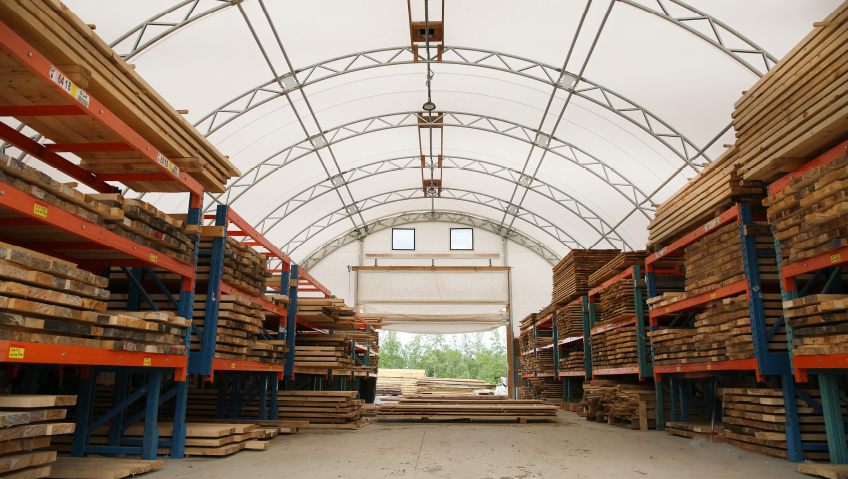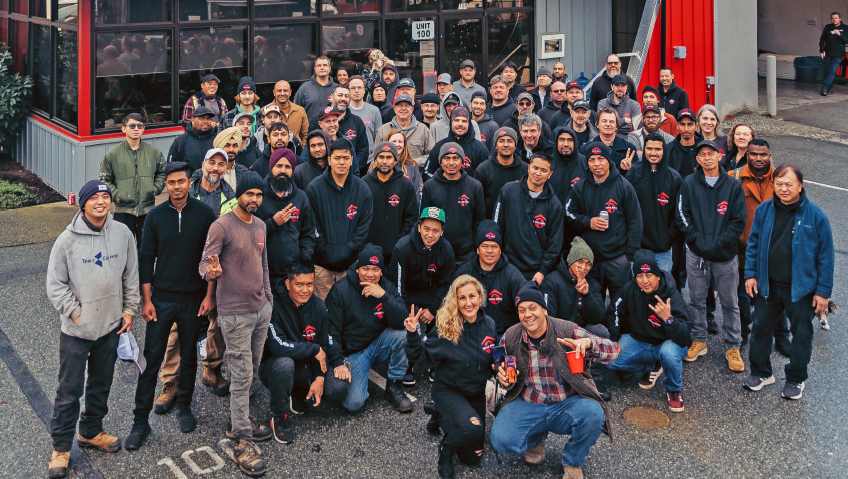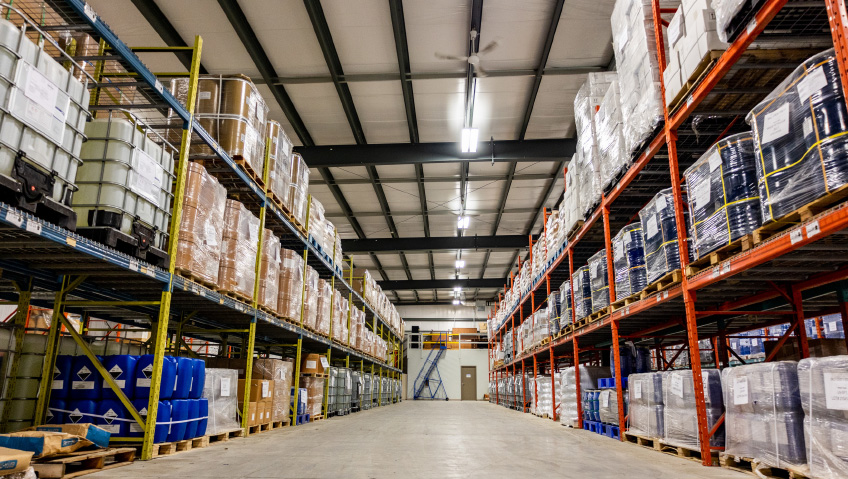Kendrick Forest Products (KFP) is preparing for a year of consolidation and planning. The thriving, family-owned business based in Edgewood, Iowa offers lumber-related products and services and has grown considerably since it was profiled in April 2022’s Resource in Focus magazine.
Having built a highly successful business since acquiring the company in the early 1980s, husband and wife co-owners Rhonda and Tim Kendrick want to maintain that.
“We are focusing this year on becoming more efficient with what we have. Because we’ve grown quickly, we have a lot of things we need to take care of,” explains Rhonda Kendrick. “We’re having our strategic planning meeting here in about three weeks, figuring out where we’re at and where we need to get to.”
The company—which still proudly has the largest sawmill in Iowa—offers sawing, harvesting, logging, grading, steaming, debarking, and drying services. It also emphasizes sustainability and safety and operates several ancillary businesses. The company’s services are generally self-performed. “We really have a strong belief that we need to do it ourselves so that we can maintain control and take care of the quality. If there’s something wrong, then it’s on us,” Rhonda notes.
KFP saws roughly 17 million board-feet per year—up from 15 million two years ago—and exports to nearly 30 countries. Finished goods include cabinets, wood signs, wood art, and home décor, and the team works with white and red oak, soft and hard maple, grey and red elm, ash, walnut, basswood, hickory, and cherry, among other varieties of lumber. And since we last spoke, the company bought a sawmill in Muscatine and a combined sawmill/dry kiln operation in Vinton, both in Iowa.
“The Muscatine facility was producing about 10,000 feet a day, and now we’re producing about 22,000 feet a day out of it. We more than doubled our production just by making some improvements that needed to be done… and working with the people by teaching them how to be more lean. It’s been a good move for us,” Rhonda says.
The relatively new Muscatine plant specializes in walnut, which made it very attractive as KFP wants to increase the amount of work it does with walnut. The Vinton business, meanwhile, was streamlined after it was acquired. The milling segment was not meeting efficiency benchmarks, so the company closed it and sold the equipment. A new steamer was purchased to improve the walnut steaming process as KFP refocused the Vinton operation to solely perform dry kiln work.
“All the walnut that’s sawn in Muscatine has been shipped to Vinton to be dried. From there, it’s either exported or shipped to our Edgewood facility,” Rhonda explains.
In the past two years, KFP also added a 36,000 square foot finished goods facility to its Edgewood base. A stacking line has been upgraded, new saws purchased, and a computerized tally system which measures lumber packs was introduced.
This is promising to be a pivotal year in the company’s history. Rhonda and Tim want to maintain a family ownership model, and the couple’s four adult children are all involved with the company. “We’re both 65, and we’re ready to cut back a bit, but they want to go, go, go. So, that’s where we’ve been in the last few years,” she says.
The company can trace its lineage to the 1950s, when Tim’s father, Don Kendrick, Sr., opened a logging and sawing business in Edgewood. That business flourished then in the early 1970s, he sold it. Sadly, the business closed just a few years after it was sold.
In the early 1980s, the shuttered sawmill was revived by Tim, his brother, and Rhonda. Dry kilns were added in the late 1980s and a cabinet company was acquired in 2001. A multi-million-dollar sawmill expansion ensued with new machinery, while new facilities, services, and businesses were added along the way.
One of those businesses, Shimlee, offers custom wood art wherein the team uploads a photograph provided by a customer and prints the image on a wooden surface. The company name is derived from shim board—a waste product from the sawing process.
Kendrick Home, which started in 2017, went through startup, then growth, and then COVID hit. Kendrick Home sales skyrocketed through online sales during the pandemic, and employment at the company reached about 160 people.
Demand for Kendrick Home art has settled down a bit, although that division—as well as other businesses including Forever Cabinets by Kendrick, Shimlee, and a printing operation—continues to thrive. KFP also sells compost, mulch, sawdust, and industrial products such as railway ties and pallet cants, and maintains a retail outlet.
Sustainability is key to KFP’s approach to business, and the company has sustainability verification certification from the National Hardwood Lumber Association (NHLA). While an ecologically friendly ethos is usually associated with opponents of logging, sustainability makes good business sense as far as this team is concerned.
“If we don’t take care of what we’ve got, what will our kids be cutting? There won’t be anything left to cut,” Rhonda states. “If we don’t manage the timber properly, we’ll get primarily maple back when it’s the oak we need. The oak gets shaded out by the maple, so you’ve got to make room for the sun to come through.”
The company harvests trees for its own use at a 1,300-acre site—100 acres more than it had two years ago—in Iowa. When possible, KFP aims to source local wood, as even the same species of tree can look different if harvested from widely dispersed areas. And, in addition to being good stewards of the forest, the company uses a biomass/steam turbine system that generates electricity by burning sawdust produced by the sawmill.
Kendrick Forest Products is a firm believer in lean manufacturing. The company uses a Kanban system and performs ‘clean sweeps’ of its facilities. In a Kanban system, work in progress is carefully tracked on a computer or board to facilitate transparency, efficiency, and communication. A clean sweep involves a comprehensive inspection of a work area to find ways to enhance operations.
“We’ve been doing lean for, I’d say, 20 years,” Rhonda shares. “When times got tough, I really credit lean for getting us through. We knew what to do, what to look for. We were focusing on efficiencies and stabilizing our growth.”
The company hired Lynn Thompson, from Toronto-based firm Quantum Lean, to visit its facilities and train staff members. The self-described ‘lean maniac’ has visited KFP on three occasions over the past year. During each of her week-long visits, Thompson trained staff and then spent time on the work floor taking notes, making observations, and suggesting ways to do things more efficiently. Rhonda was so impressed that, now, Thompson will be taking part in the company’s upcoming strategy meeting.
KFP runs tours for the public, so people can see its operations for themselves. Keeping in this same spirit, it attends trade shows in person to promote various aspects of its operations. Otherwise, the team does not do a huge amount of marketing, relying instead on its solid reputation and word-of-mouth referrals for much of its business.
Given that the company deals with saws, tall trees, and large pieces of lumber, safety is an obvious concern. Its loggers are fully insured and undertake Forest Industry Safety and Training Alliance (FISTA) instruction. Veteran loggers also teach new hires how to stay safe while working with huge trees.
In terms of challenges, Rhonda cites finding, developing, and maintaining “competent, capable people with the core values we feel are important. We try to treat our workers right.” Those values include loyalty, caring, and a good work ethic.
Other challenges include dealing with destructive insects. The emerald ash borer, a voracious beetle with a propensity for infesting then killing ash trees, remains a problem that the company deals with as best it can.
Over the next few years, Rhonda anticipates Kendrick Forest Products will focus on organization and family succession. As part of the organizational piece, a new human resources director is creating work charts showing exactly how profitable and productive the firm is every day. Rhonda would like to eventually see charts that report hourly results.
“It’s been a business that I’ve really truly enjoyed being part of,” she tells us. “I’ve met so many wonderful people. I am just really thankful I’ve had the opportunity to be involved in the company.”






